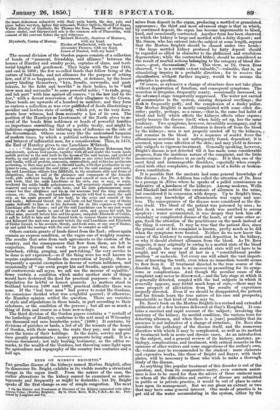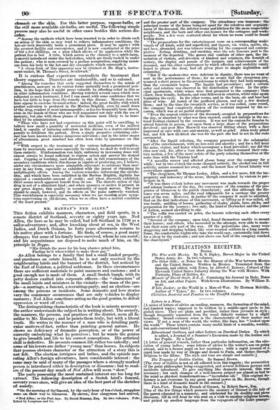REES ON MORBUS BRIGHTTL * Ton peeoliar disease of the kidneys
named Morbus Brightii, after its discoverer Dr. Bright, exhibits in its visible results a structural Change in the organ itself. From the nature of the case, the earlier alterations in the kidney cannot be examined so advan- tageously and frequently as might be desirable ; but Dr. Bright speaks of the first change as one of simple congestion. The next • On the Nature and Treatment of Diseases of the Kidney connected with Albu- minous Urine, (Mortals Brightii). By G. Owen Rees, M.D., F.R.S., Sic. &A. Pub- lished by Longman and Co, arises from deposit in the organ, produeing a mottled or granulated. appearance ; the third and most advanced stage is that in which, by continued deposit, the organ has become impermeable to blood, hard, and occasionally contracted. Another form has been observed in which the kidney is large and mottled with a fatty deposit ; and Mr. Simon, who has entered into the subject at some length, arguew that the Morbus Brightii should be classed under two heads : " the large mottled kidney produced by fatty deposit should. be regarded as allied in character to the phthisiCal and scrofulous degeneration ; while the contracted kidney should be considered. an
result of morbid actions belonging to the category of blood dis- eases,—gout, rheumatiarcE" &c. This view, as 1)r. Owen Rees observed, " is to a certain extent valuable "—valuable, that is, as stimulating inquiry in a probable direction ; for to receive the ' classification withont further inquiry, would be to assume the principles in question.
Of course, so extensive a change of structure does not take place without depravation of function, and consequent symptoms. The secretion is Irregular, frequently scanty, occasionally increased, ia the advanced stage temporarily suppressed. The water not carried off accumulates m the system, causing dropsical swellings ; the flesh is frequently puffy, and the complexion of a dusky pallor. The Morbus Brightii is mostly complicated. with some other dis- order ; partly, perhaps, as a cause,—that is, the same bad habit of blood and body which affects the kidneys affects other organs ; partly because the disease itself, when fairly set up, has the same tendency. Two symptoms, however, invariably accompany, and in fact constitute the disease. Albumen is drawn off from the blood by the kidneys ; urea is not properly carried off by the kidneys, r and remains in the blood. As a sequence of scarlet fever the albuminous secretion is not unfrequently found, dependent, it is assumed, upon some affection of the skin; and may yield in favour- able subjects to vigorous treatment. Generally speaking, however; Bright's disease is not detected till it has made some considerable progress, from the insidious nature of the complaint, and the little inconvenience it produces in an early stage. It is then one of the most fatal and unmanageable disorders, especially when compli- cated with other complaints, or the patient is of a feeble or broken- down constitution.
It is possible that the ancients had some general knowledge of this disease ; for Dr. Addison has called the attention of Dr. Ram to a passage in lEtius where he speaks of a pallid countenance as indicative of %hardness of the kidneys. Among moderns Wells, and Blackall had noticed the existence of albumen in the urine, but considered it in connexion with dropsy lip to Bright's time, however, any knowledge of albuminuria was vague and use- less. The consequences of the disease were considered as the dis- ease itself. The blood of the patient was poisoned by urea ; he died in a comatose state, and his death was ascribed to serous apoplexy : water accumulated, it was dropsy that took hins off:, secondary or complicated disease of the heart, or of some other or- gan, fixed the attention of the practitioner on the mask instead of the thing it covered. It may be true that the patient dies, since the primal seat of his complaint is known, pretty much as he did when. the symptoms were treated. Neither do we now know the cause of the tendency to congestion and deposition in the kidney, or why it should abstract albumen from the blood. As Dr. Rees suggests, it may originally be owing to a morbid state of the blood itself ; though the cause of this morbid state will yet have to be sought, and we may hind at last in a "constitutional predis- position" or eachexia. Yet every one will admit the vast import- ance of knowing the truth, even when no immediate benefit seems. to flow from it. If treatment directed to the true source of the disorder fail, there can be no success in prescribing for its symp- toms or complications. And though the peculiar cause of the complaint may never be discovered,—and the latestage at which it is generally detected, coupled with the bad subjects in which it generally appears, may forbid much hope of cure,—there may be some prospect of alleviation from the results of experience properly directed. Even if we should, be disappointed, the patient and his friends learn the true nature of his case and prospects unpalatable as that kind of truth may be.
Dr. Rees's book on the Morbus Brightii is a revised and extended publication of a few lectures delivered at Guy's Hospital. It con- tains a succinct and rapid account of the subject; involving the anatomy of the kidney, its morbid condition, the various tests for detecting albumen, and when there is a (rare) possibility that its presence is not indicative of a change of structure. Dr. Rees also considers the pathology of the disease itself, and the numerous. disorders with which it may be complicated, as well as its method of treatment both in acute and chronic cases. As an introduction to the subject, and a general review of its history, anatomy, pa- thology, complications, and treatment, with critieal remarks on the opinions of other writers and some suggestions of the author's own, the volume may be recommended to the student : more elaborate and expensive works, like those of Bright and 'layer, with their plates, will be necessary to those who wish to make a thorougk study of the disease.
As anything like popular treatment of this disorder is out of the question, and, from its comparative rarity, even common assist- ance is less to be cared for than the advice of those eminent men. to whom all the difficulties and. rarities of disease are submitted in public or in private practice, it would be out of place to enter here upon its management But we can glean an extract or two that may have some general interest One mode of practice is tcs get rid of the water accumulating in the system, either by the stomach or the skin. For this latter purpose, vapour-baths, or the still more available air-baths are useful. The following simple process may also be useful in other eases besides this serious dis- order.
"Among the methods which have been resorted to in order to obtain such an action of the skin as may tend to relieve inflammatory conditions, the hot-air-bath deservedly holds a prominent place. It may beapplici with the greatest facility and convenience, and it is now constructed at the price of but a few shillings, on a plan which allows of its application while the patient lies in bed. A tube, which serves as the chimney to a spirit-lamp, isinerely introduced under the bed-clothes, which are firmly tucked in under the patient; who is soon covered by a profuse perspiration, supplying moist- ure from his body to the hot and dry atmosphere which surrounds it. "A cheap form of this apparatus may be obtained at Mr. Big,g's, Matra- naent-maker, St Thomas's Street, Southwark."
It is curious that experience contradicts the treatment that theory suggests. Diuretics are inadmissible, and so is calomel. 'Among the remedies that early suggested themselves to the minds of practitioners, mercury- in its various forms naturally took a prominent posi- tion, in the hope that it might prove valuable by affording relief in this as in other inflammatory conditions. Having watched several eases which were subjected to such treatment, I feel I can assert with some confidence that we have but little to hope from the remedy in this disease. Mercury does not here appear to exercise its usual action : indeed, the great facility with which profuse salivation is produced in the Herbals Brightii, even by small doses of the drug, renders it most unmanageable ; as has too frequently been shown, even in the hands of those who are well acquainted not only with the use of mercury,. but also with those phases of the disease most likely to be bene- fited by its administration. "Those who have not had experience on this point will be unwilling to believe how small a quantity of mercurial medicine even of the mildest kind, is capable of inducing salivation in this disease to a degree calculated greatly to debilitate the patient Even a single purgative containing calo- mel his been known to induce dangerous salivation ; and in the latter s
of albuminania great mischief hue often been done by ignorance on point.
'"With respect to the treatment of the various inflammatory complica- tions by mereurials, and more especially by calomel, we shall do well to avoid them entirely. If inflammation run high, antimony in increasing doses will almost always be found sufficient to repress action and answer the desired end. Cupping or leeching' used discreetly, and in full remembrance of the secondary conditions which this disease is capable of producing, are, I believe, under any circumstances more admissible adjuvants to antimony than mer- cury in any. form, especially as exhibited with the intent of obtaining its antaphlogistac effects. Among the various remedies influencing the circula- tion, and which have been exhibited in the Morbus Brightu, digitalis has enjoyed a considerable amount of credit ; and when discreetly exhibited, there seems much apparent benefit from its use. The diuretic action of this drug is not of a stimulant kind ; and when =tisane or ascites is present in any great degree, this quality. is occasionally of much serviee. The dose should be I however, and its effects on the pulse nettowly. watched. This watchfulness is especially necessary when we are treatink acute symp- toms supervening on old disease, when we so often have a morbid condition of the heart present."



























 Previous page
Previous page